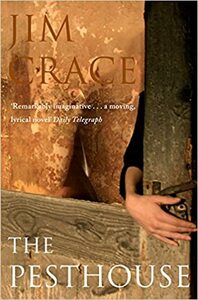Take a photo of a barcode or cover
This book was as much about the budding relationship between Franklin and Margaret as it was about their struggle to make it to the eastern coastline. It was an interesting read, although there are definitely better post-apocalyptic, plague-stricken America type books out there. I did like that even though the story occurs years and years in the future, when our buildings and roads are in ruins and factory made items are rare treasures, it feels like the past. The men all wear beards and the women all wear dresses, people travel on foot or by horse and cart, etc.
medium-paced
Plot or Character Driven:
A mix
Strong character development:
Complicated
Loveable characters:
Yes
Diverse cast of characters:
No
Flaws of characters a main focus:
Yes
Crace avoids many of the tropes these sorts of settings - have - wild, lawless places with people desperate to survive - while still acknowledging that they are a real worry for the characters.
Rather than possessing a superhuman uniqueness or good fortune, Franklin and Margaret survive through sheer determination.
In some ways it's a very quiet book - the journey itself lacks frequent bouts of intense drama but it still provides a fairly compelling journey of the choices people make, why they make them, and what they're willing to sacrifice to pursue them.
Rather than possessing a superhuman uniqueness or good fortune, Franklin and Margaret survive through sheer determination.
In some ways it's a very quiet book - the journey itself lacks frequent bouts of intense drama but it still provides a fairly compelling journey of the choices people make, why they make them, and what they're willing to sacrifice to pursue them.
This is an odd little backwards pioneer story. A few generations after the collapse of industrial civilization, Americans are heading for the east coast to try and get a berth to Europe. A man and woman meet in a pesthouse where she's been recovering from sickness and team up for the various adventures on their way. It was OK, but not compelling.
To me, a futuristic dystopian novel is an accurate tale of things that could come if the we (whomever that collective we is in said novel) stays on the same course. It is a critique of ourselves, our goverment(s) and our times.
Although this book falls into that definition, I think that this has been the least engaging one that I have read. The story is slow, I couldn't care less about our two main characters, and the writing was soporific. The two main characters exhibit lapses in logic that are both unbelievable and impossible to sympathize (with). While certain sentences were beautifully written, I could hardly say so about the entire novel.
Although this book falls into that definition, I think that this has been the least engaging one that I have read. The story is slow, I couldn't care less about our two main characters, and the writing was soporific. The two main characters exhibit lapses in logic that are both unbelievable and impossible to sympathize (with). While certain sentences were beautifully written, I could hardly say so about the entire novel.
In a future that has regressed to pioneer-style days, two strangers join together in an attempt to make it to the coast and flee America.
This is post-apocalyptic America. There is no central government, just degrading and toxic land, bandits, illness, superstition, and occasionally small towns trying to stay afloat. Franklin discovers Margaret in the "pesthouse", an isolated hut set well apart from town because she has some sort of plague-like sickness so she must be isolated until she either recovers or dies. They decide to travel together to the coast, where they have heard that ships will ferry them to Europe, an almost mythical place to them where everybody is happy and there is plenty of food and shelter to go around. Along the way they encounter slavers, thieves, and a strange religious cult that deems anything made of metal to be of the devil.
All of this is told in a dry, dispassionate, detached way. There is no excitement because the point of view is just so passive. It is like reading an old journal entry describing what happened. There's just no immediacy, so it was a slog to get through.
This is post-apocalyptic America. There is no central government, just degrading and toxic land, bandits, illness, superstition, and occasionally small towns trying to stay afloat. Franklin discovers Margaret in the "pesthouse", an isolated hut set well apart from town because she has some sort of plague-like sickness so she must be isolated until she either recovers or dies. They decide to travel together to the coast, where they have heard that ships will ferry them to Europe, an almost mythical place to them where everybody is happy and there is plenty of food and shelter to go around. Along the way they encounter slavers, thieves, and a strange religious cult that deems anything made of metal to be of the devil.
All of this is told in a dry, dispassionate, detached way. There is no excitement because the point of view is just so passive. It is like reading an old journal entry describing what happened. There's just no immediacy, so it was a slog to get through.
Like many of Crace's novels, there's a strong sense of the environment (ie, geology, biology, etc.) existing independent of and indifferent to human lives lived within it. But unlike most of his books, the story of The Pesthouse never manages to rise above the fairly familiar post-apocalyptic fantasy/quest it starts with. There are provocative ideas about the literal undoing of manifest destiny and the backwards march of history, and I loved how inevitable yet satisfying the ending was, and how surprisingly that ending doesn't come off as pessimistic or depressing (I won't say how and spoil it). But whereas Crace's characters are always living what amount to small human lives in the face of a big, indifferent world, those lives usually have enough complexity to avoid seeming like ciphers or types, and I guess that just didn't happen for me with this novel (the way it did, for instance, with Signals Of Distress and it's complex reinvention of the tropes of a historical, maritime novel). So it ended up feeling like a fairly cliché story that only pointed toward what it might have been.
This book is set in a futuristic post-apocalyptic type America, that is surprisingly reminiscent of frontier America in terms of technology and lifestyle. Franklin Lopez, traveling with his brother Jackson to the east coast, in hopes of boarding a ship to escape America, is injured, and thus becomes separated from his brother. He soon meets a woman named Margaret, confined to a pesthouse by an apparent outbreak of flux. Margaret and Franklin begin to travel together toward the east, meeting rogues, ruffians, religious extremists, scared average folks, and desperate people along the way. They are separated for a time, but come back together, joined by others along the way.
This book was ok, but didn't seem all that original. Maybe it's because I recently read The Road by Cormac McCarthy, which also discusses traveling through post-apocalyptic America, or maybe it's just because it really felt like the book was more about a rather banal romance between an awkward man and a hesitant spinster than about humans struggling to survive in an apocalyptic world. Plus the frontier vibe kept throwing me off, I kept forgetting that this was supposedly in the future. And the narrator kept breaking out of voice to ask questions like "Why did Franklin do such and such?" or "How did Margaret respond to so and so?" which is always annoying to me.
This book was ok, but didn't seem all that original. Maybe it's because I recently read The Road by Cormac McCarthy, which also discusses traveling through post-apocalyptic America, or maybe it's just because it really felt like the book was more about a rather banal romance between an awkward man and a hesitant spinster than about humans struggling to survive in an apocalyptic world. Plus the frontier vibe kept throwing me off, I kept forgetting that this was supposedly in the future. And the narrator kept breaking out of voice to ask questions like "Why did Franklin do such and such?" or "How did Margaret respond to so and so?" which is always annoying to me.
This guy knows how to make his sentences count. Both Crace novels I've read have been short and strong and well worth the time. He sinks me into his worlds and does an admirable job of playing with his themes & motifs throughout - they're very cohesive objects, these books. I tend to be more enchanted by characters and plots than themes and world building, but when those aspects are as strong as Crace's, I'm happy to shift my allegiances for a while.



